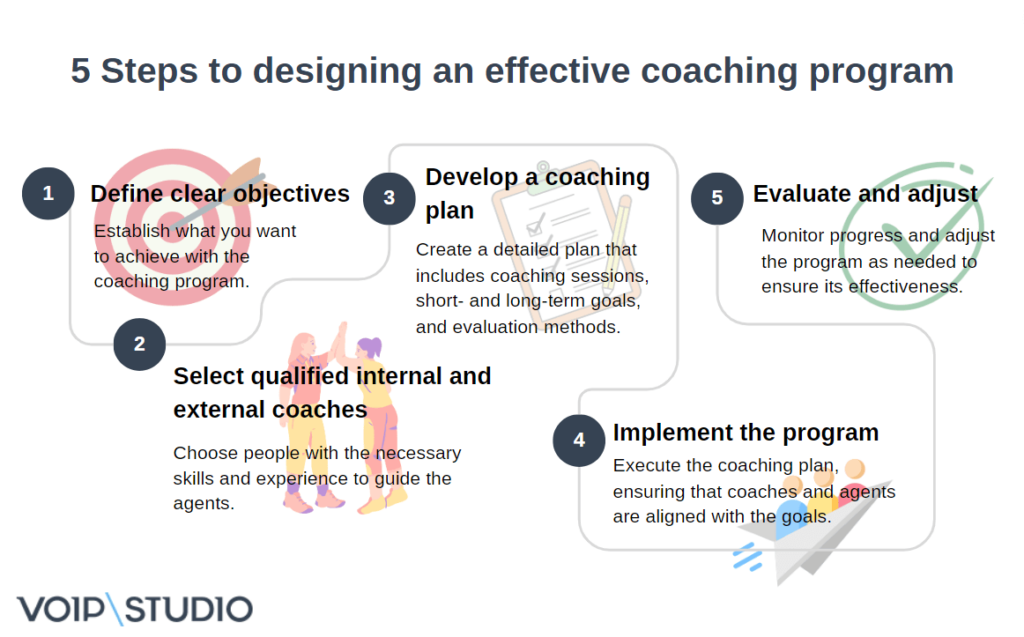
Table of contents
Customer service is a fundamental pillar in any company that aims to maintain a solid and lasting relationship with its customers.
In call centers, this importance is magnified, as they are the direct and primary point of contact between the company and the customer.
Coaching in call centers offers numerous benefits that improve individual agent performance and the overall efficiency and effectiveness of the call center.
What is call center coaching?
Call center coaching is a practice focused on continuously developing and improving customer service agents through specific guidance and training techniques.
Coaching is a dynamic and personalized process unlike traditional training, which can be more general and static. It aims to identify strengths and areas for improvement in each agent and provides constructive feedback and tools for professional growth.
Objectives of call center coaching
The goal of call center coaching is twofold:
- Improve individual agent performance: By increasing their effectiveness and efficiency in resolving customer queries and issues.
- Enhance the overall quality of service provided by the call center: This translates into a more satisfying customer experience and a more remarkable ability for the call center to meet and exceed market expectations.
Expert advice

By implementing an effective coaching program, companies can enhance customer satisfaction and retention, develop employee potential, and create a positive and productive work environment.
Invest in coaching for your call center and see how it improves customer service and your company’s overall success.
Benefits of coaching in call centers
Companies can create a positive and motivating work environment by investing in their employees’ continuous development. Here are some of the most significant benefits of coaching in call centers:
Improvement in customer service quality
Coaching helps agents develop more effective communication skills, leading to smoother and more satisfying interactions with customers:
- By receiving personalized guidance, agents learn to handle queries and complaints better, offering quicker and more appropriate solutions.
- It significantly improves the quality of customer service, increasing customer satisfaction and loyalty.
Increase in customer satisfaction and retention
High-quality customer service, provided by well-trained and motivated agents, directly impacts customer satisfaction:
- Customers who receive professional and efficient treatment are more likely to return to do business with the company and recommend it to others.
- It increases customer retention and can generate new business opportunities through word of mouth.
Professional development of agents
Coaching provides agents with opportunities for continuous professional growth and development.
- Agents can improve their performance and feel more confident by receiving constructive feedback and learning new skills.
- It enhances their performance and increases their motivation and commitment to the company.
Reduction in staff turnover
Call centers often face high levels of staff turnover, which can be costly and disruptive.
- Coaching helps create a positive and supportive work environment where agents feel valued and appreciated.
- By investing in the development of their employees, companies can increase staff retention and reduce the costs associated with hiring and training new agents.
Improvement in operational efficiency
Through coaching, agents learn to manage their tasks more efficiently, optimizing the use of time and available resources.
- This improves their individual productivity and enhances the operational efficiency of the call center as a whole.
- A well-trained team of agents can resolve customer queries more quickly, reducing wait times and increasing customer satisfaction.
Adaptability to changes and new challenges
The call center environment can be dynamic and subject to frequent changes, such as the introduction of new technologies or changes in company policies.
- Coaching prepares agents to adapt to these changes, providing them the skills and flexibility to face new challenges.
- An adaptable team can maintain high-performance levels even in changing situations.
Critical components of call center coaching
To implement an effective coaching program in a call center, it’s crucial to focus on specific key components. That will ensure the success of the process. Here are some of these components:
Current performance assessment
The first step in any coaching program is evaluating the agents’ current performance.
- It involves collecting data and metrics about their performance, such as call handling time, first contact resolution, and customer satisfaction.
Identification of improvement areas
Based on the performance evaluation, it is essential to identify the specific areas where each agent needs improvement.
- It can include technical skills, product or service knowledge, or qualities such as empathy and communication.
Setting clear goals and objectives
An essential component of coaching is setting clear and achievable goals and objectives.
- These goals should be specific, measurable, achievable, relevant, and time-bound (SMART).
Effective coaching techniques in call centers
Constructive and regular feedback
Feedback is a powerful tool in the coaching process. Constructive feedback helps agents understand what they are doing well and where to improve.
The feedback must be specific, solution-oriented, and delivered promptly.
Communication skills training
Communication skills are crucial for call center agents.
Training in these skills, through workshops and practical exercises, can help agents better handle interactions with customers, effectively resolve issues, and improve customer satisfaction.
Role-playing and simulations
Role-playing and simulations allow agents to practice and refine their skills in a controlled environment.
These activities can simulate real situations agents face in their daily calls, allowing them to develop confidence and competence.
Extracting examples from call recordings
Using examples from call recordings as a coaching technique in call centers is very important as it allows for a realistic and objective evaluation of agent performance.
Additionally, it facilitates monitoring progress and developing best practices.
Identifying performance trends by call type
This technique allows you to recognize specific patterns in agent performance based on the type of call (e.g., sales, technical support, general inquiries).
By identifying these trends, coaching strategies can be personalized to address the particular needs of each type of interaction.
Detecting performance issues through real-time observation and monitoring
Real-time observation allows coaches to identify performance issues as they occur, facilitating immediate and timely intervention. It helps correct mistakes and provides more dynamic and adaptive training, assisting agents to improve quickly.
Implementing an effective coaching program
To implement a successful coaching program, specific steps should be followed and appropriate tools utilized:
Steps to design a call center coaching program

Measurement and progress monitoring
To ensure the coaching program is meeting its objectives, it is essential to measure and track progress regularly:
Key performance indicators (KPIs) to assess coaching success
We have already talked about the importance of measuring call center productivity.
KPIs, such as customer satisfaction, call resolution time, and first contact resolution rate, are key metrics that can indicate the success of coaching.
Monitoring these indicators helps evaluate the impact of coaching on agent performance and customer service quality.
Methods to collect and analyze data
Analysis tools and performance management software can facilitate data collection and analysis. These methods allow for identifying trends, measuring progress, and making necessary adjustments to the coaching program to maintain its effectiveness.
How can AI help with coaching in your call center?
Artificial intelligence (AI) can play a crucial role in coaching in call centers, offering several significant advantages.
These advancements enable more precise and effective coaching, improving agent performance and customer service quality.
Automated call analysis
AI can automatically transcribe and analyze thousands of calls, identifying patterns and trends in agent behavior and customer interactions.
- It allows coaches to focus on specific areas that need improvement based on precise and detailed data.
Real-Time feedback
AI tools can provide real-time feedback during calls, helping agents adjust their approach while talking to customers.
- For example, they can receive suggestions on handling objections or improving their tone of voice. It increases the effectiveness of coaching and immediately enhances the customer experience.
Emotion detection
AI algorithms can analyze the tone of voice and language used by agents and customers, detecting emotions and moods.
- It helps coaches better understand call dynamics and offer more practical guidance on handling difficult emotional situations.
Automation of repetitive tasks
AI can handle repetitive administrative tasks, such as scheduling coaching sessions and collecting performance data.
- It frees time for coaches to focus on higher-value activities, such as personalized agent development.
Simulations and role-playing
AI tools can create simulated scenarios and role-playing exercises based on real call situations. It provides agents with a safe environment to practice and hone their skills.
- These simulations can be tailored to each agent’s specific needs, offering a personalized and effective learning experience.
Continuous performance measurement
AI can monitor agent performance and generate detailed reports showing their progress.
- It allows coaches to adjust their strategies and approaches based on the latest data, ensuring continuous and sustainable improvement.
Looking for a way to improve your call center coaching and agent experience?
VoIPstudio is a VoIP communications platform that can be a powerful tool for implementing an adequate coaching strategy.
Implementing VoIPstudio in your call center coaching strategy offers many tools that facilitate more efficient coaching.

By leveraging its over 40 advanced PBX features, you can ensure continuous improvement in agent performance and customer service quality.
VoIPstudio features to improve call center coaching
- Call recording: VoIPstudio allows recording all incoming and outgoing calls. These recordings can be reviewed later to evaluate agent performance. Analyzing these recordings lets you provide specific and constructive feedback based on real examples, helping agents identify and correct their mistakes.
- Real-time monitoring: The platform offers the creation of barometers to monitor calls in real time. It means coaches can listen to calls as they are happening and, if necessary, intervene or provide immediate feedback. This live monitoring capability is crucial for detecting and addressing performance issues on the spot.
- Detailed statistics and reports: VoIPstudio provides advanced analysis and reporting tools. You can use this data to identify performance trends, such as average call handling time, first contact resolution rate, and other important KPIs. These reports allow you to focus coaching on specific areas that need improvement.
- Integration with CRM and other tools: VoIPstudio’s integration with CRM systems and other customer management tools provides a more comprehensive view of customer interactions. Coaches can access call histories and other relevant data to provide more contextualized and effective coaching.
- Conference and whisper coaching features: VoIPstudio supports conferences and “whisper coaching,” where a coach can speak to the agent without the customer hearing. This feature, known as call intrusion, is useful for guiding agents during live calls and helping them improve their skills in real time. The following video shows how to apply this functionality in VoIPstudio.
Case studies where VoIPstudio helped call centers like yours
Case studie 1: Cloud VoIP and simPRO
Learn how the global call center operations of simPRO became more efficient, agile, and effective.

Case studie 2: eContact Services and VoIPstudio
Discover how VoIPstudio helps the telemarketing and demand generation agency eContact Services manage call costs.

FAQs about call center coaching
How can I measure the effectiveness of a coaching program in my call center?
To measure the effectiveness of a coaching program in a call center, you can use key performance indicators (KPIs) such as customer satisfaction, first contact resolution rate, average call handling time, and staff turnover. It is also helpful to conduct feedback surveys with agents to assess their perception of coaching and its impact on their performance and job satisfaction.
What qualities should a good coach have in a call center?
A good coach should have excellent communication skills, empathy, patience, and the ability to provide constructive feedback. Additionally, they should be well-informed about call center operations, able to identify areas for improvement, and capable of motivating and guiding agents to achieve their goals.
How often should coaching sessions be held in a call center?
The frequency of coaching sessions can vary depending on the call center’s and the agents’ needs. However, it is recommended to hold coaching sessions regularly, at least once a month, to ensure continuous follow-up and improvement. In some cases, more frequent sessions, such as weekly, may be beneficial, especially for new agents or those facing specific challenges.
How can I personalize coaching for each agent?
To personalize coaching for each agent, it is essential to assess their performance and understand their strengths and areas for improvement. Use tools like performance evaluations, call recordings, and customer feedback. Then, set personalized goals and create a specific development plan for each agent, ensuring that feedback and coaching activities are relevant and tailored to their needs and objectives.
What role do emerging technologies like sentiment analysis play in call center coaching?
Emerging technologies, such as sentiment analysis, play a crucial role in call center coaching by providing a deeper understanding of interactions between agents and customers. Sentiment analysis can identify emotions and attitudes in real time, allowing coaches to address communication issues and improve agent empathy. It helps personalize coaching and develop strategies to handle customer emotions better, enhancing customer service quality.
More from the blog
Want to improve your business communication?
Unlock enterprise-class call center power at affordable prices – no hardware, no delays, no surprises!






